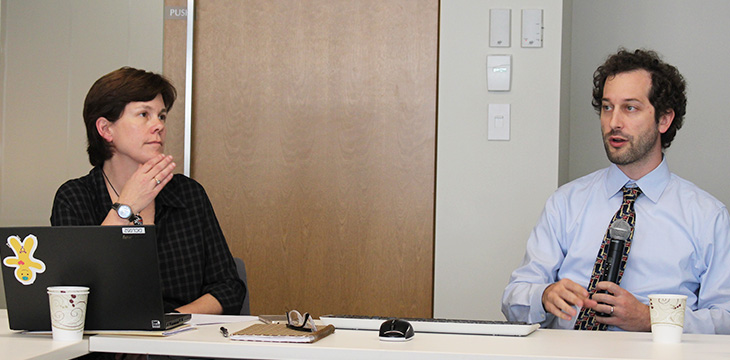The Health Policy Project ended in 2016. Work continued under Health Policy Plus (HP+) until 2022.
NEWS & VIEWS

Ann Hendrix Jenkins (Health Policy Project) and David Jacobstein (USAID) presenting the webinar. Photo by Health Policy Project
May 12, 2015
WASHINGTON, DC—Most agree that capacity development is an underlying goal of all global health efforts, and see it as an indispensable element of sustainability. Yet it is an underused approach—either because it is assumed to happen automatically, or because it is overshadowed by short-term objectives.
A recent online seminar covered this and other issues complicating the pursuit of capacity development by the global health community. “Capacity Development: Where Is It Heading? Practical Insights for Improving Global Health Outcomes” was convened by the Health Policy Project (HPP)—funded by the U.S. Agency for International Development (USAID) and the U.S. President’s Emergency Plan for AIDS Relief (PEPFAR)—as one of many knowledge-sharing activities scheduled from now to September 22, when the project will end.
Three panelists spoke and fielded questions on the implications of capacity development for implementing organizations, donors, and global health professionals. Much of the seminar explored the dilemmas of linking the intangible nature of “capacity” to the goal of producing measurable, real-world change.
Ann Hendrix-Jenkins, HPP’s technical director for capacity building, described HPP’s capacity development principles and interventions designed to support improved health policy, advocacy, governance, and finance. One of the complexities of capacity development, she said, is its long time frame. She mentioned as an example HPP’s recent work with advocates in Malawi to institute a line item for family planning in the national budget. The effort succeeded, “which was a great win, but the first allocation was small.” For the allocation to be sustained and to grow, she said, “capacity development with advocates and Parliament must be ongoing.”
David Jacobstein, an international development expert with experience in eastern Europe, Africa, and Asia, discussed USAID’s Local Systems framework, published last year. The framework promotes “a vision of development that is locally owned, locally led, and locally sustained” and informs an understanding of organizational capacity development that is rooted in how an organization fits into a wider system. Mr. Jacobstein pointed out that “the paradigm for measuring capacity development is contribution, not attribution.” A capacity development initiative might support better performance, he said, but you can’t prove a causal relationship, because such initiatives don’t happen in a vacuum.
Helen Cornman, deputy director of JSI’s AIDSFree Project, helped to start the Capacity Development Network, a community of practice. She talked about the changing landscape of development work, in which local nongovernmental organizations (NGOs) are increasingly the prime contractors and international partners are the subcontractors. “Local NGOS have a big learning curve on mastering USAID rules and regulations, managing large procurement processes, developing boards, instituting timesheets, and establishing subgranting policies and procedures,” she said, making capacity development all the more important.
What's New
- Something to Build On: “Innovation Exchange” Celebrates the Health Policy Project’s Close and a New Beginning
- What Will it Take for Tanzania to Achieve ART Targets and Ensure Long-Term Sustainability of the HIV Response?
- Helping Kenya’s County Leaders Advocate for Increased Health Investments
- HPP Holds Working Meeting on Ensuring Responsible PEPFAR Transitions for Key Populations
- Health Policy Project Celebrates 2016 International Women's Day
- HPP Staff Participate in White House Conference on HIV Stigma Reduction

